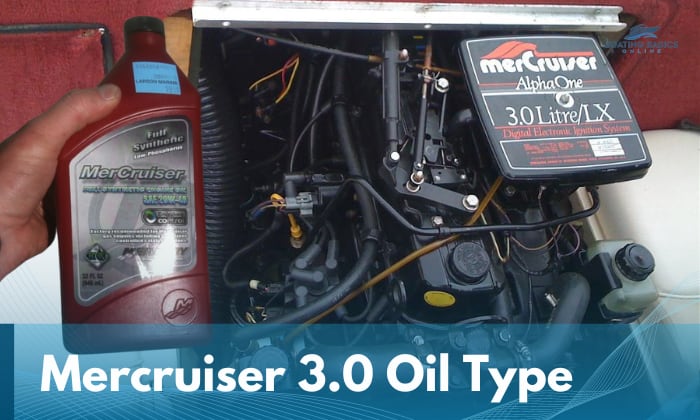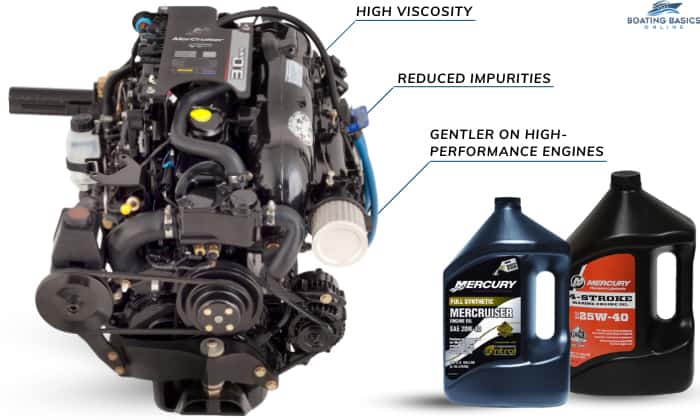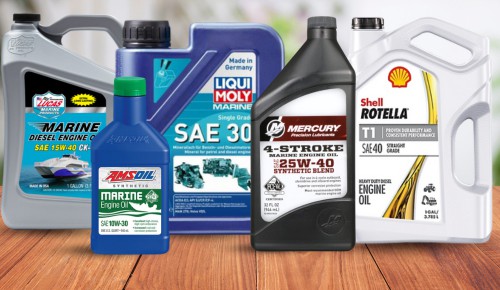Are you feeling a little lost when trying to figure out the correct Mercruiser 3.0 oil type to use because you lost the manufacturer’s manual? Or are you exploring other viable options?
Here’s the gist. Mercruiser recommends you use its own SAE 20W-40 full synthetic oil or SAE 25W-40.
However, it’s entirely allowed to use alternatives such as 15W-40 (either synthetic or conventional by Mercury or Quicksilver), 4-cycle oils by reputable brands, 10W-30 engine oils, or a high-grade, straight-weight oil with detergent.
Table of Contents
The Oil Type for Mercruiser 3.0 Engine
I get that there can be plenty of confusion about the actual recommended oil for 3.0 Mercruiser. The older manuals stated that Quicksilver 4-Cycle 25W-40 should be used. But that was way before Mercruiser came up with their own engine oil.
Now, the brand makes it clear that you should use the Mercruiser SAE 20W-40/SAE 25W-40 full synthetic engine oil, which has the following characteristics:
1. High viscosity – The first number, 20 (or 25), represents the oil’s winter rating, while 40 signifies its base rating. The thicker the oil, the higher its number.
A SAE 20W-4o rating indicates that the oil can perform well in high temperatures and winter conditions. In addition, the oil can function under extreme motor loads.
2. Reduced Impurities – This decreases the risk of acid formation within diesel engines.
3. Gentler on High-Performance Engines – This means engines with higher RPMs will not undergo as much wear and tear.
While conventional oils do work for Mercruiser 3.0 engine, it can’t be denied that synthetic oils are the better choice simply because the former doesn’t offer the same advantages.
It’s also worth keeping in mind the standard oil guidelines for various types of Mercruiser 3.0 engines, such as the ones below:
Any 4-stroke engine with a horsepower range of 2.4 HP to 140 HP and above will work well with type 10W-30 and 25W-40 oils. If it’s catalyzed or non-catalyzed 4-stroke, though, then it’s not recommended to use 10W-30.
It’s made clear that 4-stroke engines best work with 25W-40; however, you still have to consider the latest manufacturer’s recommendations.
Inboard marine engines and sterndrive engines should steer clear of 10W-30 and stick to either conventional or synthetic 25W-40.
Mercruiser 3.0 Motor Oil Guide
1. Factors to consider when choosing oil
Several critical factors should be taken into account to ensure optimal performance and longevity of the engine.
- First and foremost, be mindful of the appropriate viscosity rating, as discussed above, relative to the manufacturer’s recommendations. Keep in mind that using the oil with the wrong rating is always bad news for your engine.
- Regardless of the oil type you choose, make sure it’s formulated for boats.
- Don’t overlook the typical operating conditions of your vessel. If you frequently put high loads on your engine, you may need to select the most suitable oil that can handle those specific scenarios.
- No less important is the varying oil capacity of every model. You have to make sure you’re only filling up the engine according to the capacity indicated in the manual.
2. List of verified alternative oils for Mercruiser 3.0 engines
Any time you find yourself struggling to find the official 20W-40 oil made by Mercruiser specifically for its engines, feel free to look for these other alternatives:
- 15W40 synthetic blend (recommended for warmer regions)
- Straight 30 weight oil
- 10W-30
- 4-cycle oils (any brands will do)
- High-grade, straight-weight oil with detergent
Conclusion
The most ideal Mercruiser 3.0 oil type, in short, is either the one the brand formulated or, following standard guidelines, any synthetic 25W-40 oil available to you.
Overall, these engines are lenient in that they aren’t just limited to one or two types of oil, though. Still, opting for the most recommended options is undoubtedly the wisest route since they’ll impart undeniable advantages for the engine.

“My intention from the first day establishing Boating Basics Online is to provide as much help as possible for boaters who want to experience a first safe and convenient trip. So feel free to join us and share your beautiful journeys to the sea!”




